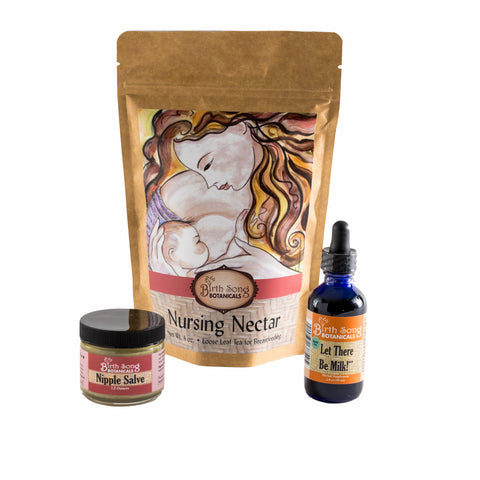Is My Baby Getting Enough Breastmilk?

For a new mama, nothing is more important than seeing her baby thrive and grow. Nursing a baby for the first time can be an overwhelming experience. Between making sure you have a good latch, dealing with sore nipples (what IS normal anyway?), and making sure you have snacks and water within reach, it is so easy to get frustrated. However, more than anything else, new mamas worry about their babies getting enough milk.
First of all, take a moment to take a deep breath and close your eyes. Be still and remember that your body is amazing! It grew this baby, you birthed this baby, and you can feed this baby. Think about your own self-care first. In order to nourish your baby, you need to be well-hydrated, well fed, and as rested as you can be. Nourish your body with healing foods and herbs. Move and stretch - even if it’s just around the living room for five minutes. Have someone else hold your baby for 15 minutes so that you can take a shower, brush your teeth, and put on fresh clothes. Now we can talk about ways to tell if your baby is getting enough breastmilk.
Things that have nothing to do with breastmilk supply
- How often your baby wants to nurse. A newborn’s stomach is tiny. Before your milk comes in, their little bodies are designed to thrive on the incredible colostrum that you make. This liquid gold provides them everything they need in the first couple of days. Your baby’s job during this time, besides being adorable, is to bring in your milk supply. This happens by nursing, and nursing, and nursing. New babies need to nurse often and for good lengths of time. We are so used to the way adults eat that it is easy to assume that if your newborn finished nursing ten minutes ago and they want to eat again, it must be because they didn’t get enough to eat the first time. This is not true, though. Your baby nurses to be close to you, for comfort, and for the safety you provide. Their frequent, unrestricted, and unscheduled nursing will ensure a strong and healthy milk supply.
- How much you can pump. If you are concerned about your milk supply, sometimes it seems to make sense to try out a breast pump to see how much milk you are making. And then you may either be reassured because you can pump a lot, or you get even more worried because you could only pump a little bit. Remember that a breast pump is not a baby. Your ability to nurse a baby has nothing to do with how you respond to a breast pump. Nursing a baby is a very tactile and sensory experience - you hold the baby close to your body, you smell them, you see them. All of these things are triggers that tell your body to let the milk flow. When you are pumping it is just not the same. There is no baby to hold and the physical sensations are much different. Many women who successfully nursed multiple children were never able to pump more than an ounce or two at a time. How much you can pump is not necessarily the same amount that your baby is getting through nursing.
Ways to accurately gauge breastmilk supply
- Weight gain in your baby. Remember that it is totally normal for a newborn to lose as much as 10% of their body weight in the first week. They should be back to their birth weight by two weeks and gain steadily after that.
- Diapers! How much your baby pees and poops are huge indicators that they are getting enough milk. A good rule of thumb is that before your milk comes in, the wet and poopy diapers should equal the days old of the baby. So a two-day-old baby should have at least two wet diapers and at least two bowel movements. Once your milk is in, you should see at least six wet diapers and several poopy in a day.
- Overall well-being of your baby. Does she look hydrated and healthy? Is she alert when she is awake? Sometimes babies will frantically nurse when they first latch, but as they get full, they will relax and begin to sleep. This is completely normal. Some babies will want to sleep at your breast all the time, and will startle and start to nurse again if you try to lay them down. Some babies will nurse for a while, and then fall off the breast when they fall asleep. All of this is normal.
- Can you tell your baby is getting milk when he nurses? A baby will nurse in short, quicker suckles when they first latch on. They will do this for several minutes until your milk starts to flow. Then they will switch to a longer draw in and a more wide, open-mouthed suckle. You may even be able to hear them swallow then. If you are very concerned about your baby getting milk when he nurses, you can weigh your baby before and after nursing. Make sure that you use a scale that is accurate to ounces, and that you weigh the baby with the same clothes on and a dry diaper each time.
More than likely, your body is fully capable of making enough breastmilk for your baby. If you suspect that you are not making enough milk, contact your midwife or doctor, your local IBCLC certified lactation consultant, or La Leche League. You can support your lactation through nourishing herbal teas and tinctures. Even if your supply has dipped for some reason, there are many ways to help make it strong again. Don’t worry mama, you can do this. Let your milk and love flow!
I hope these tips helped support your breastfeeding success!
Hug your sweet baby, and remember to let your love and your milk flow!
Maria
🌿
🌿Want More?!? Check These Out! 🌿
Breastfeeding Immediately After Birth
7 Tips for Breastfeeding Success
The Ultimate Breastfeeding Guide
Breastfeeding 101- Best Breastfeeding Practices
Four Healthy Habits to Start on Your Baby’s First Day
8 Things I Wish I Knew About Breastfeeding Before Giving Birth!
How to Treat Clogged Milk Ducts and Prevent Mastitis.
Why Do I Have a Low Milk Supply?
How to Increase Your Breastmilk Supply Quickly
Treating Nipple Thrush Naturally
How to Heal Sore Nipples from Breastfeeding
How to Achieve A Proper Breastfeeding Latch
Herbs To Avoid While Breastfeeding
Benefits of Fenugreek for Breastfeeding
Safe Herbs for Breastfeeding With A Cold
Breastfeeding While Sick
The First Few Weeks of Breastfeeding
Best Baby Carriers for Breastfeeding
Four Common Breastfeeding Problems and Solutions
Three Lactation Problems and How to Solve Them
Three Breastfeeding Tips for New Moms
How to Include Your Partner While Breastfeeding
How Often Should I Breastfeed?
How to Wake a Sleepy Newborn to Breastfeed
Is My Baby Getting Enough Milk?
Normal Weight Gain for Breastfed Babies
4 Signs Your Baby is Having a Growth Spurt
Breastfeeding A Baby with Tongue or Lip Tie
Breastfeeding After a Cesarean Section
Breastfeeding in Special Circumstances
Breastfeeding with Flat or Inverted Nipples
Breastfeeding a Pre-Term Baby
Tandem Breastfeeding
Breastfeeding Twins
Do I Need A Breast Pump?
Pumping Breast Milk to Return to Work
Breastfeeding Nutrition
Healthy Snacks for Breastfeeding
How to Know If You’re Dehydrated While Nursing
Breastfeeding Boosts Babies' Immune Systems and Prevents Illness
Breastfeeding Saves Sleep
Safe Co Sleeping with Your Baby
Tips for Breastfeeding While Pregnant
Breastfeeding in Public
Breastfeeding and Sex
Breastfeeding and Birth Control
The Relationship Between Breastfeeding and Menstruation
When Will My Menstrual Cycle Return After Having a Baby
Five Benefits to Extended Breastfeeding
How Breastfeeding Changes As Baby Grows
Five Reasons to Breastfeed Your Baby After Six Months
Weaning Gently and Intuitively
Is CBD Oil Safe for Breastfeeding and Lactation?
Can I Drink Alcohol and Breastfeed?
How My Breastfeeding Failure Was My Biggest Win
Common Holiday Breastfeeding Issues and How to Prevent Them!
Re-Lactation and Induced Lactation: Breastfeeding After a Break or When You Never Have
Remember to:
Like our Birth Song Botanicals Facebook Page
Follow Birth Song Botanicals Co. on Instagram
Read our Birth Song Botanicals Blog
Watch Birth Song Botanicals on Youtube
Listen to Birth Song Botanicals on SoundCloud
Be inspired by Birth Song Botanicals on Pinterest







